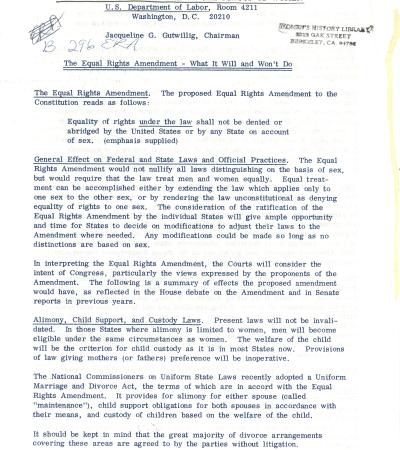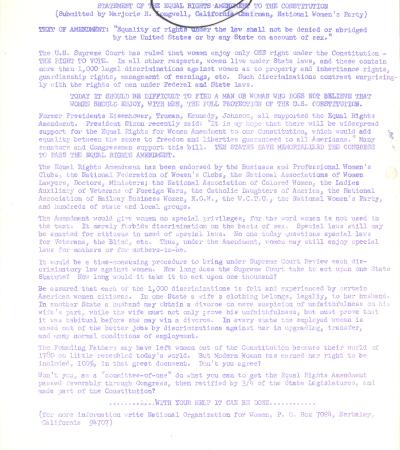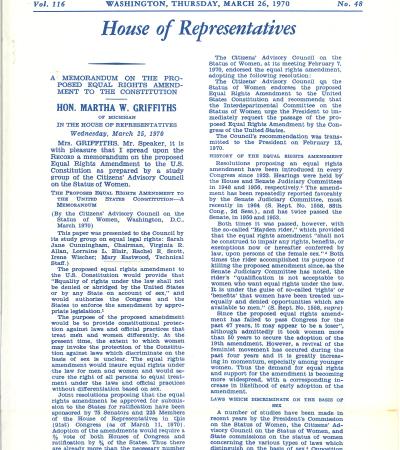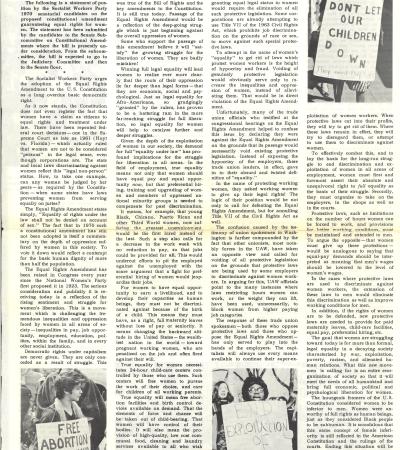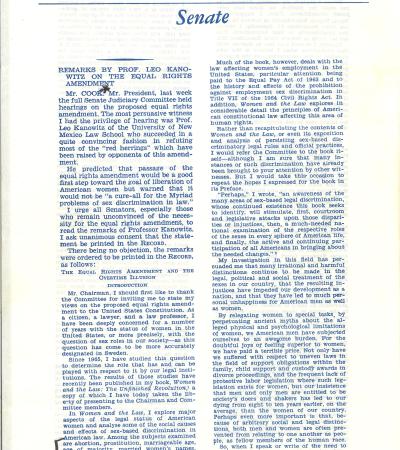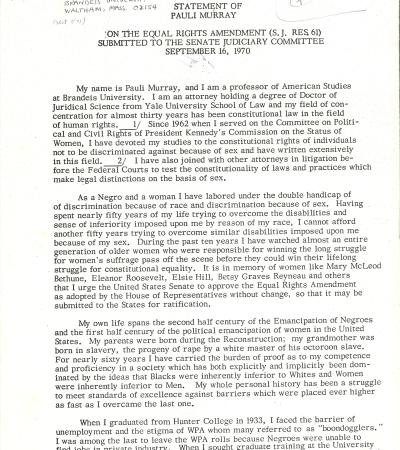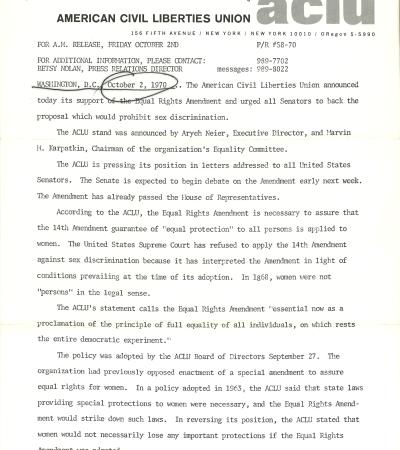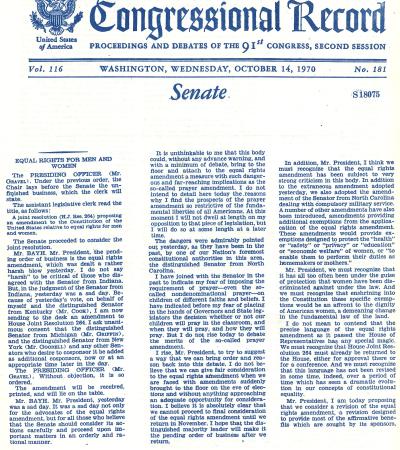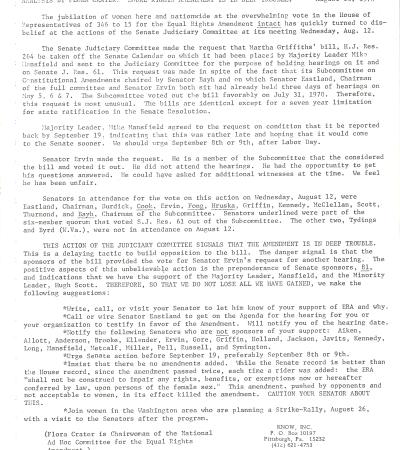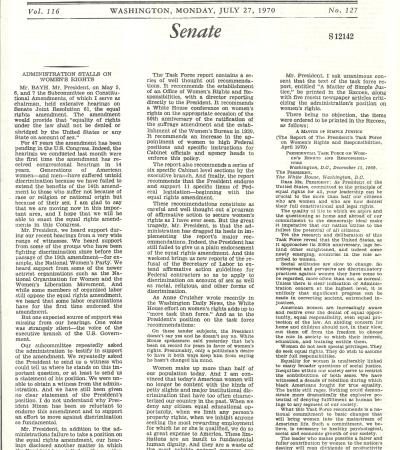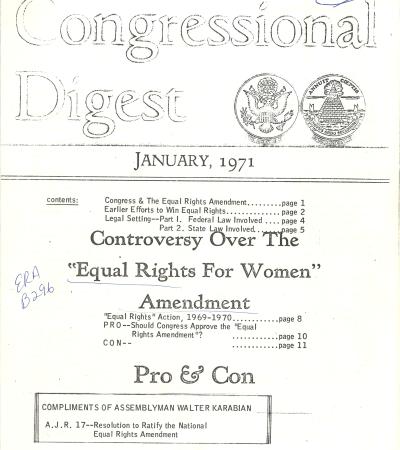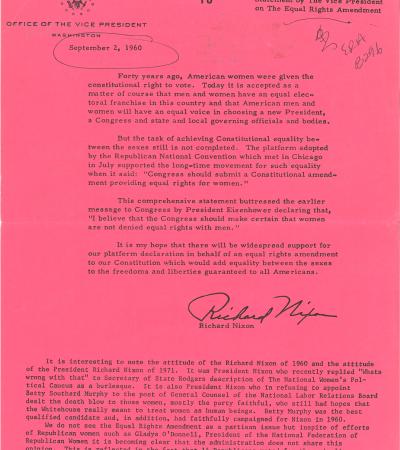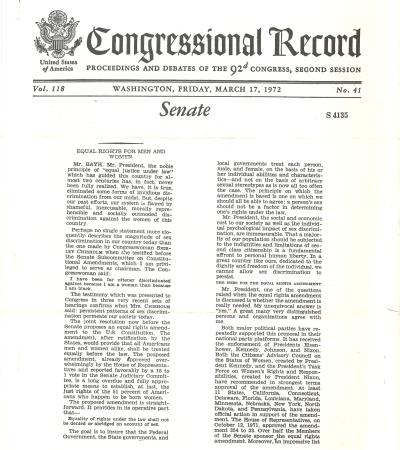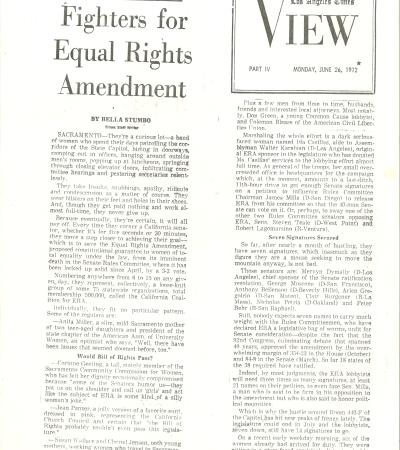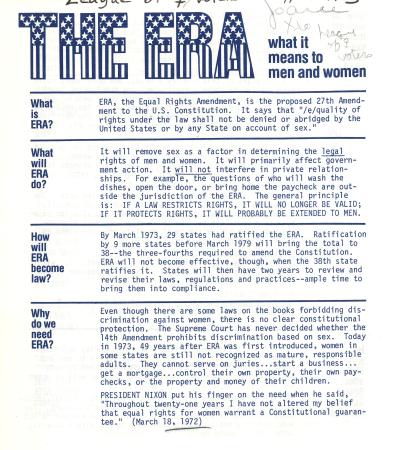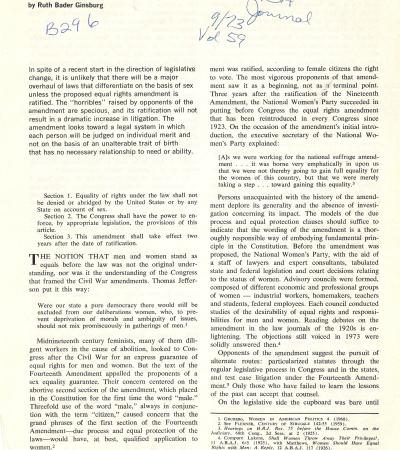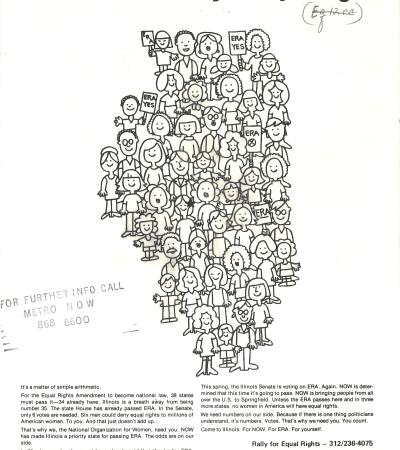The Women’s History Research Center was founded in 1969 in Berkeley, California by Laura Murra (also known as Laura X). The organization collected materials to document current and historical issues relating to women. Among the collection are materials related to the Equal Rights Amendment, including copies of the U.S. Congressional Record during the period when Congress was considering the ERA. There are also statements, articles, and press releases in support of the ERA.
Additional content for this collection can be found in the "Inventory for collection."
"The Equal Rights Amendment - What It Will and Won't Do", August 28, 1970
This document, prepared by the Citizens' Advisory Council on the Status of Women, which was a group formed under the U.S. Department of Labor, briefly outlines how the Equal Rights Amendment might affect existing laws and policies.
"Statement of the Equal Rights Amendment to the Constitution" by Marjorie R. Longwell, 1970
Longwell, the California Chairman of the National Women's Party, writes outlining support for the amendment and the discriminations women face in the absence of the amendment.
U.S. House of Representatives Congressional Record, March 26, 1970
This document includes a memorandum on the proposed Equal Rights Amendment prepared by a study group of the Citizens' Advistory Council on the Status of Women. The memorandum was introduced into the record of the U.S. House of Representatives by Representative Martha W. Griffiths of Michigan.
"SWP candidates urge Congress adopt equal rights amendment", The Militant, June 26, 1970
This article includes a statement of position by the Socialist Workers Party regarding their support for the Equal Rights Amendment. The statement was submitted to the Senate Subcommittee on Constitutional Amendments.
U.S. Senate Congressional Record, September 14, 1970
This document captures the remarks of Professor Leo Kanowitz in support of the Equal Rights Amendment. Kanowitz refutes many of the arguments made by opponents of the ERA.
Statement of Pauli Murray on the Equal Rights Amendment, September 16, 1970
Murray provides her statement to the Senate Judiciary Committee which is considering the Equal Rights Amendment. She is a professor and attorney with expertise in constitutional law in the field of human rights.
American Civil Liberties Union Press Release, October 2, 1970
The ACLU announces its support of the Equal Rights Amendment. This is significant, as in the 1950s the ACLU had opposed the amendment.
U.S. Senate Congressional Record, October 7, 1970
This document captures the remarks of Senator Birch Bayh, who was instrumental in helping pass the Equal Rights Amendment through the U.S. Senate.
U.S. Senate Congressional Record, October 14, 1970
This document captures additional remarks of Senator Birch Bayh as he speaks in favor of the Equal Rights Amendment.
"Analysis By Flora Crater: Equal Rights Amendment Is In Deep Trouble", August 13, 1970
Crater is Chairwoman of the National Ad Hoc Committee for the Equal Rights Amendment. This analysis outlines the actions taken by the Senate Judiciary Committee and urges readers to pressure their Senators to vote favorably on the Equal Rights Amendment.
U.S. Senate Congressional Record, July 27, 1970
This documents Senator Birch Bayh's remarks on the status of the Equal Rights Amendment after the hearings of the Subcommittee on Constitutional Amendments.
Congressional Digest, January 1971
This document, prepared by Assemblyman Walter Karabian, is a robust report on the Equal Rights Amendment, covering Congressional action, laws involved and pros and cons.
Statement by Vice President Richard Nixon, September 2, 1960
This statement, made by Richard Nixon when he was serving as vice president, is accompanied by 1971 remarks of his that are contradictory. In 1960, Nixon supported the Equal Rights Amendment. By 1971, his attitude towards the ERA was not obvious.
U.S. Senate Congressional Record, March 17, 1972
This documents Senator Birch Bayh's remarks in support of the Equal Rights Amendment just days before the vote on the ERA on the Senate floor.
"11th-Hour Lobbyists - Fighters for Equal Rights Amendment" by Bella Stumbo, Los Angeles Times, June 26, 1972
This article profiles the California women who lobbied their state senators and representatives to ratify the Equal Rights Amendment. California eventually ratified the ERA in November of 1972.
"The ERA - what it means to men and women", 1973
This pamphlet, prepared by the League of Women Votes, answers commonly asked questions about the Equal Rights Amendment, which the League supports.
"The Need for the Equal Rights Amendment" by Ruth Bader Ginsburg, American Bar Association Journal, September 1973
Ginsburg, then a Columbia University law professor, and the co-ordinator of the American Civil Liberties Union Women's Rights Project, writes in support of the Equal Rights Amendment.
"Come to Illinois. Rally for Equal Rights" flyer, May 15-16, 1976
This flyer encouraged supporters to travel to Springfield, the capitol of Illinois, where the state House had already voted in favor of the Equal Rights Amendment. The Illinois Senate had a planned vote on ratification. If the Senate voted yes on ratification, Illinois would have been the 35th state to ratify the ERA. Ultimately the Illinois Senate did not ratify the ERA in 1976.
